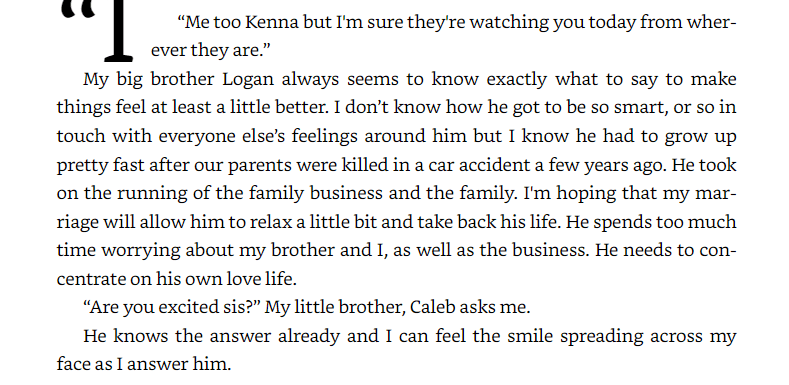This post was originally published on this site.
Last week, The Snarky Editor posted a challenge — find the (at least) nine editing errors in this section of a published book. How many did you find?
Here are The Snarky Editor’s fixes:
-
“Me too, Kenna, but I’m sure…” — The name isn’t an integral part of the sentence, so it should be set off with commas. If you felt that too should also be set off with a separate comma, you’re not wrong, but it’s a judgment call and not — strictly speaking — an error. Making that change would also mean three commas in three words — “Me, too, Kenna…” — which just looks weird.
-
“I don’t know how he got to be so smart or so in touch with everyone else’s feelings around him, but I know…” — Compound sentences — when you combine two separate sentences into one — are divided with a comma before the connector (but, in this case). Here, just to complicate things, the first sentence also has a compound element, so smart and so in touch with everyone else’s feelings around him. But those elements are equal parts of the first sentence and shouldn’t be separated with a comma.
-
“so in touch with everyone else’s feelings, but I know…” around him is redundant, confusing, and ultimately meaningless — how can he be affected by the feelings of anyone who isn’t closely associated with him?
-
“He spends too much time worrying about my brother and me.” — Applying the rule of thumb on handling pronouns — to look at whether the pronoun makes sense in the sentence if we leave out the other noun — tells us that I in this context is wrong. She wouldn’t say, “He spends too much time worrying about I.”
-
“Are you excited, sis?” — Here, sis isn’t a necessary part of the sentence, so as in the first example, it should be separated from the rest by a comma.
-
“My little brother Caleb asks me.” There are two ways to handle this construction, and either one is acceptable. Either the name is separated from the rest of the surrounding sentence by two commas, or — because the name is so brief and so closely related to the noun it’s associated with — no commas. But it shouldn’t be set off with just one comma. Compare this with the earlier sentence starting “My big brother Logan always seems…” which is correct, though “My big brother, Logan, always seems…” would also be just fine. In this case, the Snarky Editor opted for consistency by treating both brothers in the same way.
-
“Are you excited, sis?” my little brother Caleb asks me. When an attribution follows the speech and is just he says or the equivalent, like my little brother says, then it’s not capitalized — even when the dialogue line ends with a question mark or an exclamation point. If this was a fully-structured sentence like My little brother Caleb scratched his head, then it would start with a capital letter. (The Snarky Editor sympathizes. These rules get complicated.)
-
Suddenly I’m engulfed in my brothers’ arms. The arms belong to the brothers, so we need an apostrophe to show possession and ownership. Since there are two brothers and they’re both hugging our heroine, we need the plural possessive, brothers’. If only one brother was doing the hugging, she would be engulfed in my brother’s arms. Also, both is redundant here, because the plural possessive, used properly, does the work to tell us that she’s being hugged by two people.
-
“We love you, sis, and we’re glad…” Sis, as a stand-in for the name, is not a necessary part of this sentence. We love you and we’re glad… would be a perfectly-acceptable sentence. Since sis is inserted into the middle of the sentence, it needs a comma before and after to set it off from the rest.
How did you do? Let’s talk about it!
The Snarky Editor comes out of hiding occasionally to comment on the awkward, silly, and sometimes hilarious editing errors found in published books.
#snarkyeditor #everybodyneedsaneditor
Leigh Michaels is the award-winning author of more than 100 books, including historical and contemporary romance, non-fiction books about writing, and local history. More than 35 million copies of her books are in print in 27 languages and more than 120 countries. She is also a writing coach and book editor, though she promises to be snarky only in regard to published books.
To find out more, check out https://leighmichaels.com


Leave a Reply